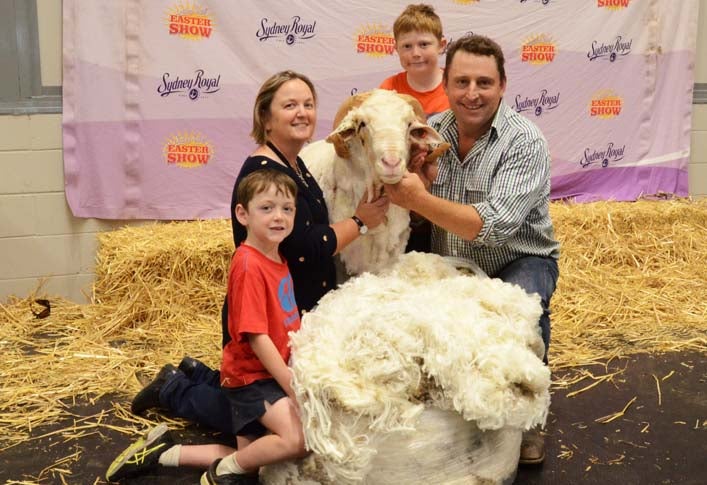Posted by on
25/05/2021
Following in the footsteps of five generations before them, NSW merino wool producers Michael and Jane Corkhill are now steering their family legacy with technology, ensuring its strong future for their two sons – and the Australian industry.
The Corkhills, of Reids Flat in the Boorowa district, run a mixed farming operation that includes “Grassy Creek Merinos”, a stud and commercial merino flock.
In recent years Michael and Jane, together with sons Toby, 11, and Hugh, nine, have increased their focus on progressive breeding techniques for a continual improvement in their wool and stock.
Michael believed it was an extremely exciting time to be in the industry, with innovation taking the guesswork out of measuring Australian Sheep Breeding Values (ASBVs) – the national database comparing an animal’s generic merit for traits such as growth, eating quality, wool quality, health and reproductive strength.
“We’re investing in the background so we can be assured we’re making informed decisions regarding our breeding values for greater production on-farm – whilst contributing to a superior quality flock nationwide.”
Electronic identification tags, artificial insemination and embryo transfers exemplify some of the modern techniques the Corkhills have implemented over the past 20 years to help improve livestock genetics and enhance reproductive efficiency, with the operation recently taking its data accuracy one step further thanks to genomic testing.
“We take an ear tissue sample from each sheep for DNA testing and this gives us an even wider range of information about each animal through its genomics and its genetics – very helpful tools in determining the reproductive success when joining ewe lambs, and thus the productivity of the flock.”
“We can now accurately promote the animals that deserve to be promoted, and weed out the poor performers that are letting the team down.”
Michael said thanks to genomic testing his previous joining rate of one ram to 80 ewes has now improved to five rams to 500 ewes, with his ‘lamb down’ rate – the number of lambs weaned on ewes joined – now measured with 100 per cent accuracy using DNA to ensure full parentage.
“We can lamb down and know exactly who mum and dad is - it’s amazing technology – we can lamb a big commercial group, take a DNA sample and get full parentage and improved data accuracy surrounding twin and single birth rates and breeding values.”
Improving wool quality was also a priority for the Corkhills.
The bulk of their wool is China-bound, with a small percentage sold into the European high-end market, with Michael and Jane currently trialling the Australian Wool Exchange (AWEX) WoolClip app, which allows them to create an online ‘wool book’, where each bale is scanned, and data from the corresponding mob and bale details recorded.
“This is just another example of improved performance data accuracy, and further promotes the traceability of our produce so that consumers across the globe can have full assurance in the quality of our Australian wool.”
Over the past 20 years, Michael said Grassy Creek Merinos had doubled its wool cut, decreased wool fibre diameter and through focussing on early growth rates, had increased body weights by over 25 per cent.
“The gains we’re making through improved genetics performance recording and technology are extraordinary, it’s a fantastic time to be in agriculture and I can’t wait to see what these sheep are like in another six years – they’re just getting better and better.”
Thank you Corkhill family for your progressive adoption of innovation – you really have taken the ram by the horns ensuring our Australian sheep and wool industry retains its world leading reputation for quality assurance and reliable, data-driven ASBVs.
